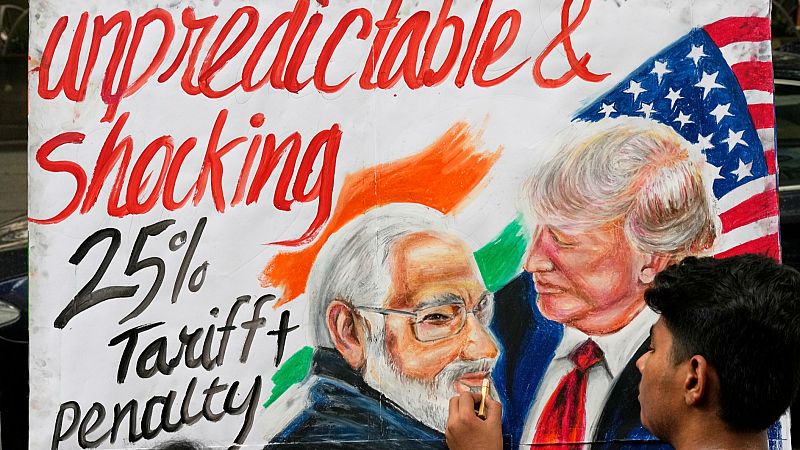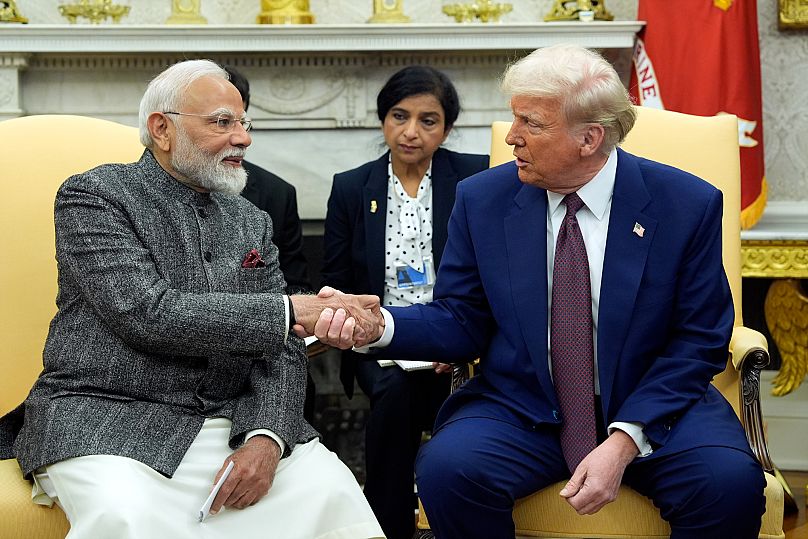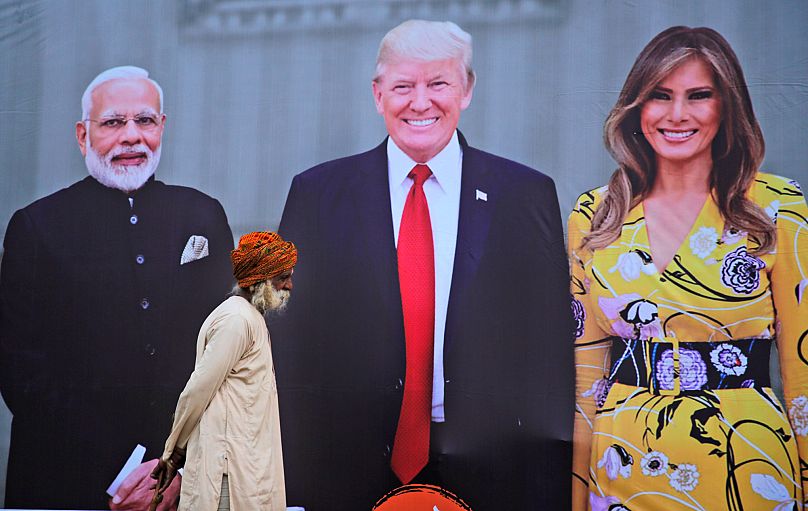Tariff showdown shatters once robust populist alliance between Trump and Modi

The men shared bear hugs, showered praise on each other, and made appearances side by side at stadium rallies — a big optics boost for two populist leaders with many ideological similarities. Each called the other a good friend.
In India, the bonhomie between Prime Minister Narendra Modi and US President Donald Trump was seen as a relationship like no other. That is, until a series of events gummed up the works.
From Trump’s tariffs and India’s purchase of oil from Russia to a US tilt towards Pakistan, friction between New Delhi and Washington has been hard to miss. And much of it has happened far from the corridors of power and, unsurprisingly, through Trump’s posts on social media.
It has left policy experts wondering whether the camaraderie the two leaders shared may be a thing of the past, even though Trump has stopped short of referring to Modi directly on social media. The dip in rapport, some say, puts a strategic bilateral relationship built over decades at risk.
“This is a testing time for the relationship,” said Ashok Malik, a former policy adviser in India’s Foreign Ministry.
The White House did not immediately respond to a message seeking comment.
Simmering tensions over trade and tariffs
The latest hiccup between India and the US emerged last week when Trump announced that he was slapping 25% tariffs on India as well as an unspecified penalty because of India’s purchase of Russian oil.
For New Delhi, such a move from its largest trading partner is expected to be felt across sectors, but it also led to a sense of unease in India — even more so when Trump, on social media, called India’s economy “dead”.
Trump’s recent statements reflect his frustration with the pace of trade talks with India, according to a White House official who was not authorised to speak publicly and spoke on condition of anonymity to describe internal administration thinking. The Republican president has not been pursuing any strategic realignment with Pakistan, according to the official, but is instead trying to play hardball in negotiations.
Trump doubled down on the pressure Monday with a fresh post on Truth Social, in which he accused India of buying “massive amounts” of oil from Russia and then “selling it on the Open Market for big profits".
“They don’t care how many people in Ukraine are being killed by the Russian War Machine. Because of this, I will be substantially raising the tariff paid by India to the USA,” he said.
The messaging appears to have stung Modi’s administration, which has been hard-selling negotiations with Trump’s team over a trade deal by balancing between India’s protectionist system while also opening up the country’s market to more American goods.
“Strenuous, uninterrupted and bipartisan efforts in both capitals over the past 25 years are being put at risk by not just the tariffs but by fast and loose statements and social media posts,” said Malik, who heads the India chapter of The Asia Group, a US advisory firm.
Malik also said the trade deal the Indian side has offered to the US is the “most expansive in this country’s history,” referring to reports that India was willing to open up to some American agricultural products. That is a politically sensitive issue for Modi, who faced a yearlong farmers’ protest a few years ago.
Trump appears to be tilting toward Pakistan
The unravelling may have gained momentum over tariffs, but the tensions have been palpable for a while. Much of it has to do with Trump growing closer to Pakistan, India’s nuclear rival in the neighbourhood.
In May, India and Pakistan traded a series of military strikes over a gun massacre in the disputed Kashmir region that New Delhi blamed on Islamabad. Pakistan denied the accusations. The four-day conflict made the possibility of a nuclear conflagration between the two sides seem real and the fighting only stopped when global powers intervened.
But it was Trump’s claims of mediation and an offer to work to provide a “solution” regarding the dispute over Kashmir that made Modi’s administration uneasy. Since then, Trump has repeated nearly two dozen times that he brokered peace between India and Pakistan.
For Modi, that is a risky — even nervy — territory. Domestically, he has positioned himself as a leader who is tough on Pakistan. Internationally, he has made huge diplomatic efforts to isolate the country. So Trump’s claims cut a deep wound, prompting a sense in India that the US may no longer be its strategic partner.
India insists that Kashmir is India’s internal issue and had opposed any third-party intervention. Last week Modi appeared to dismiss Trump’s claims after India’s opposition began demanding answers from him. Modi said that “no country in the world stopped” the fighting between India and Pakistan, but he did not name Trump.
Trump has also appeared to be warming up to Pakistan, even praising its counterterrorism efforts. Hours after levying tariffs on India, Trump announced a “massive” oil exploration deal with Pakistan, saying that one day, India might have to buy oil from Islamabad. Earlier, he also hosted one of Pakistan’s top military officials at a private lunch.
Sreeram Sundar Chaulia, an expert at New Delhi’s Jindal School of International Affairs, said Trump’s sudden admiration for Pakistan as a great partner in counterterrorism has “definitely soured” the mood in India.
Chaulia said “the best-case scenario is that this is just a passing Trump whim”, but he also warned that “if financial and energy deals are indeed being struck between the US and Pakistan, it will dent the US-India strategic partnership and lead to loss of confidence in the US in Indian eyes".
India’s oil purchases from Russia are an irritant
India had faced strong pressure from the Biden administration to cut back its oil purchases from Moscow during the early months of Russia's invasion of Ukraine. Instead, India bought more, making it the second-biggest buyer of Russian oil after China. That pressure sputtered over time and the US focused more on building strategic ties with India, which is seen as a bulwark against a rising China.
Trump’s threat to penalise India over oil, however, brought back those issues.
On Sunday, the Trump administration made its frustrations over ties between India and Russia ever more public. Stephen Miller, deputy chief of staff at the White House, accused India of financing Russia’s war in Ukraine by purchasing oil from Moscow, saying it was "not acceptable".
Miller's remarks were followed by another Trump social media post on Monday in which he again threatened to raise tariffs on goods from India over its Russian oil purchases.
“India is not only buying massive amounts of Russian oil, they are then, for much of the oil purchased, selling it on the open market for big profits. They don’t care how many people in Ukraine are being killed by the Russian War Machine," Trump wrote.
Some experts, though, suspect Trump's remarks are mere pressure tactics.
“Given the wild fluctuations in Trump’s policies,” Chaulia said, “it may return to high fives and hugs again.”
India says it will safeguard its interests
Many expected India to react strongly over Trump's tariff threats considering Modi’s carefully crafted reputation of strength. Instead, the announcement prompted a rather careful response from India’s commerce minister, Piyush Goyal, who said the two countries are working toward a "fair, balanced and mutually beneficial bilateral trade agreement".
Initially, India’s Foreign Ministry also played down suggestions of any strain. But in a statement late Monday, it called Trump’s criticism “unjustified and unreasonable” and said it will take “all necessary measures to safeguard its national interests and economic security".
It said India began importing oil from Russia because traditional supplies were diverted to Europe after the outbreak of the Ukraine conflict, calling it a “necessity compelled by global market situation".
The statement also noted US trade with Russia.
“It is revealing that the very nations criticising India are themselves indulging in trade with Russia,” the statement said.
Today



